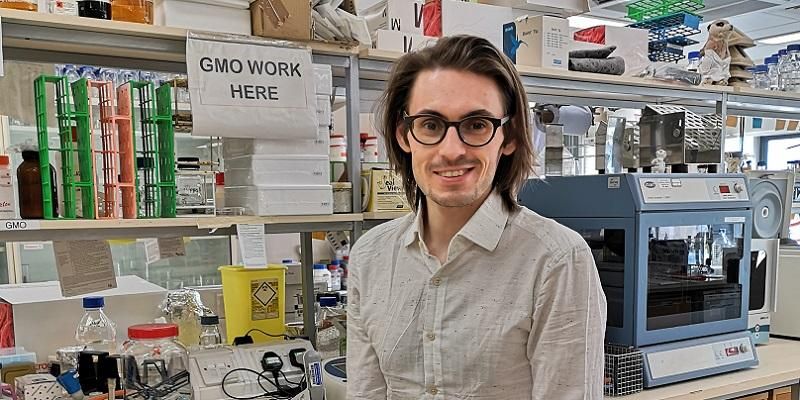Dr Morgan Herod, University Academic Fellow

Dr Morgan Herod is a virologist specialising in viruses which cause gastroenteric infections such as the norovirus. His research aims to identify the basic principles of how these types of viruses enter host cells, replicate new viruses and spread between hosts.
After completing his PhD in virology and taking up a postdoctoral researcher position at Leeds, Dr Herod secured preliminary funding from the University of Leeds - Wellcome Trust Institution Strategic Support Fund (ISSF) - which enables academics to transfer from a postdoctoral role to becoming an independent researcher.
He then went on to successfully bid for an externally-funded fellowship with the Medical Research Council (MRC) to study how noroviruses co-ordinate entry into host cells and assembly of new virus particles. Leeds was his University of choice because it has all the relevant expertise, equipment and a strong support network to enable his project to succeed.
During his fellowship, Dr Herod became part of the Astbury Centre for Structural Molecular Biology at Leeds which brings together researchers from physics, biological sciences and chemistry to understand the molecular basis of life. The Centre has a strong track record not just in structural molecular biology, but in supporting PhD students and early career researchers.
It was during his time in the Astbury Centre that Dr Herod applied to be a University Academic Fellow (UAF), as he recognised that he could thrive and develop in an environment which is collaborative and nurtures an interdisciplinary approach.
The UAF programme is designed to develop a strong group of future research leaders at the University. UAFs follow a structured five year development programme leading to a permanent Associate Professor position and a Fellowship of Advance HE.
He explains: “I reached a crossroads where I could have either gone down the independent researcher route or apply to become a UAF - which I felt would help to strengthen my research and leadership skills and lead to new opportunities.
“Since winning a place on the coveted scheme, I have established a lab and started to manage my own team, which I have never done before. I’ve been supported by peers and senior colleagues in learning how to do this effectively.
"The interdisciplinary approach to research is a key strength of the University, and since being here, I have forged really useful connections with colleagues not just in the Astbury Centre, but across the wider University."
“By speaking to people with different expertise, researchers are able to better probe their area of interest and apply different research techniques, meaning that they can gain a fuller and more detailed understanding of a complex research area”.
One of the key aspects of the scheme is the opportunity to be mentored by senior and experienced academics.
Dr Herod explains: “I am fortunate enough to have both formal and informal mentors and I have learnt such a lot from the senior academics who are so giving of their time. We have regular meetings to discuss ideas and approaches to challenges.
“In addition, there is as strong community of UAFs in the School of Molecular and Cellular Biology, as well as in the Astbury Centre. We have informal get-togethers where we can discuss areas of commonality and support each other.”
The UAF program has enabled Dr Herod to quickly expand his research portfolio through the recruitment and supervision of undergraduate and postgraduate research students, building on the existing expertise currently available in the lab. This additional capacity means that he can initiate new projects and expand into unchartered research areas.